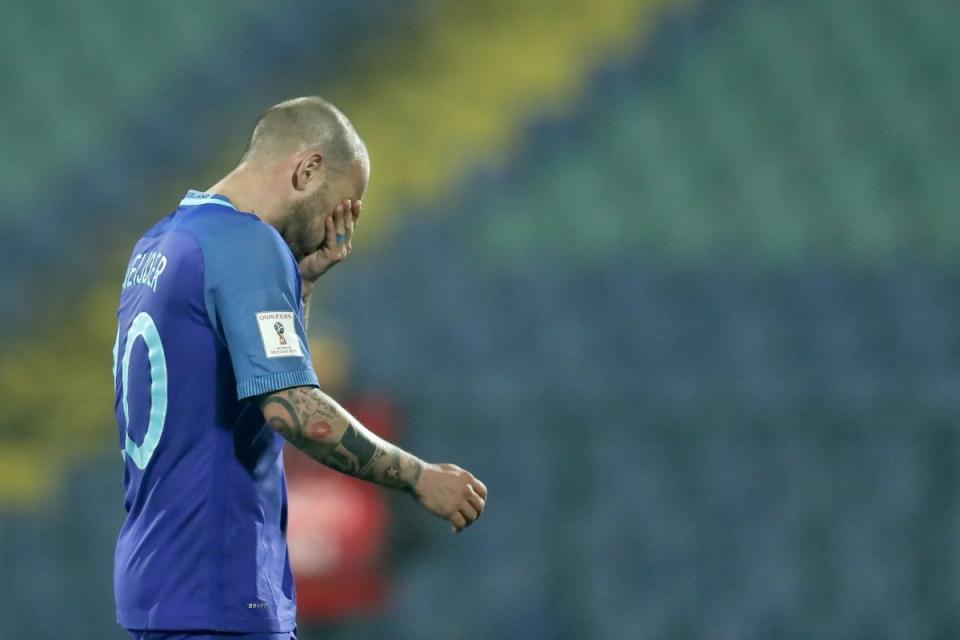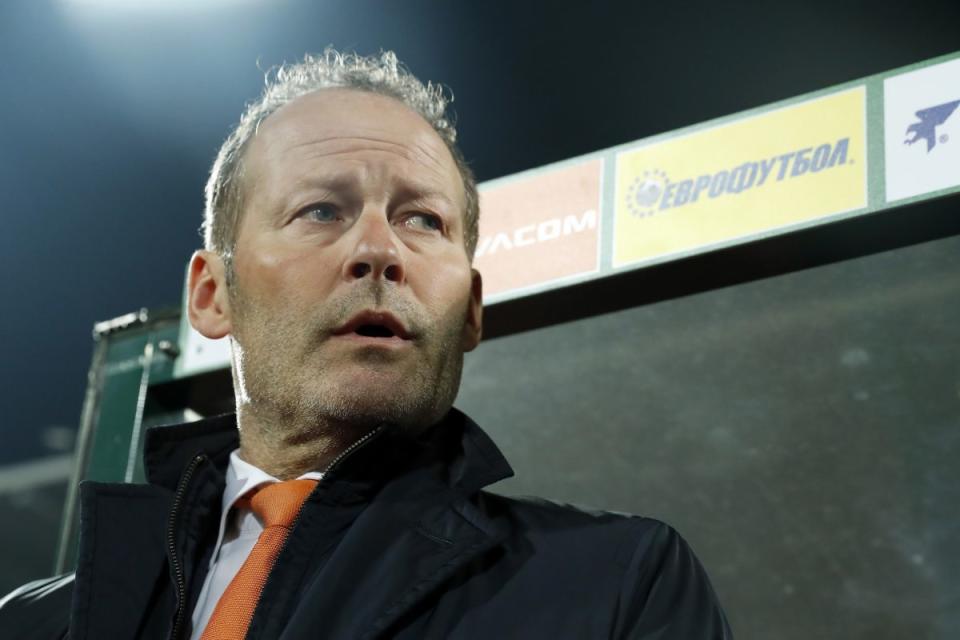The Netherlands isn't very good at soccer anymore — and for now, that's OK

If you had assumed that the Netherlands would just always be good at soccer, this was an understandable leap in logic to make. After all, the Dutch had been good for so long – pretty much continuously since the early 1970s – that it seemed a given, in spite of sourcing their national team from a population that only recently reached 17 million.
But as the noted analytics maven Michael Caley points out, what’s actually noteworthy isn’t that the Dutch are now no longer good. What’s remarkable is that they didn’t turn bad sooner.
In many ways the weirder thing about the Dutch national team is a country of 17m avoiding a truly fallow period of talent for three decades.
— Michael Caley (@MC_of_A) March 27, 2017
And for the record, they are now bad. While Oranje reached the semifinals of the World Cup for a second time in a row in 2014 – placing third in Brazil, four years after coming second in South Africa – things have spiraled hopelessly out of control since. Manager Louis van Gaal, the architect of the World Cup success with a tactical scheme that masked the issues of a lopsided team – brilliant in the attack; full of liabilities in defense – left for Manchester United and was succeeded by Guus Hiddink, an inspirational coach but famously a tactical lightweight.
Under Hiddink, the Dutch made a halting 3-2-1 (W-L-T) start to Euro 2016 qualifying before the veteran manager was fired. His successor, Danny Blind, has somehow had a 12-year run as either head coach or assistant manager of his old club and the national team, without ever demonstrating any particular aptitude for it. The Netherlands missed the Euros under him – even though it was expanded from 16 to 24 teams — coming fourth in a six-team group, behind Iceland, the Czech Republic and Turkey, respectively.
Blind was allowed to stay on, for some reason, and the side kept on stumbling, getting off to a 2-2-1 start to World Cup qualifying. The Dutch again sit in fourth place, below France, Sweden and Bulgaria – who comfortably won 2-0 at home against the three-time World Cup runners-up on Friday. Blind was fired on Sunday.
But while there are five more qualifiers to play, it already feels like it’s too late to recover and make it to Russia next summer. The play has been so poor that it simply seems unrealistic to climb above Sweden and even Bulgaria – which hasn’t been to a World Cup since 1998 – a sentiment only confirmed by the sad display in Tuesday’s 2-1 friendly loss to Italy, which isn’t exactly a world superpower at the moment either.
Just as problematically, there is no apparently good choice to replace Blind – who was appointed not just to assist Hiddink in 2014, but to succeed him after the Euros, a succession plan that looks ridiculously premature and hubristic in retrospect. The two best Dutch managers currently out there aren’t interested. Ronald Koeman wanted the job in 2014 but was only offered Blind’s assistant-successor arrangement. He turned it down and has since thrived with Southampton and Everton in the Premier League. Frank de Boer wants to make amends on the club level after flaming out with Inter Milan, following a wildly successful spell at Ajax.
Louis van Gaal has demurred on a return – he’d rather run the entire federation instead. Which leaves the 69-year-old Dick Advocaat as the least uninspired of the Dutch options, although neither of his two previous spells as Holland manager lived up to expectations – a quarterfinal finish at the ’94 World Cup and a semifinal berth at Euro ’04, when more was expected.
Alternatively, the country that once consistently produced some of the best managers in the sport would have to go with a foreigner – in itself an indictment on the state of the Dutch game.

Either way, the material at the new boss’s disposal is limited in every line. And this is the crux of the problem. The golden generation that played from Euro ’96 through the 2006 World Cup was succeeded by the foursome of Robin van Persie, Arjen Robben, Wesley Sneijder and Rafael van der Vaart, whose transcendent attacking talents compensated for the dearth of decent defenders.
Of the following generation that ought to be displacing them, however, only Southampton’s central defender Vigil van Dijk has the makings of a truly world-class player – ironically enough, since the Netherlands hasn’t produced one of those in the back since Jaap Stam. It’s telling enough that the team is still heavily reliant on the 32-year-old Sneijder, even though he is at least half a decade past his prime, and Robben, who can’t seem to stay healthy. The two still command so much clout that they are demanding a say in the pick of the new manager.
If the new waves of talent are limited, we should also concede that the rot set in a long time ago. The Dutch were dazzling at Euro 2008, battering Italy and France in the group stage, before, predictably, crashing out in the very next round to Hiddink’s Russia. Marco van Basten was the last manager to successfully play expansive football – although the received wisdom is that the team’s veteran core actually handled the tactics.
His successor, Bert van Marwijk, had played results-football – as it’s described in the Netherlands, and this is very much an insult – in two stints at Feyenoord and rode it to a UEFA Cup victory. He had no qualms about replicating it with the national team, to the horror of his aesthete countrymen, because he understood that if he didn’t field two midfield bruisers in Nigel de Jong and Mark van Bommel, the brittle defense would be overrun. He’d hold things down in the back and leave his dominant attack to nab a few goals at the other end.
At Euro 2012, van Marwijk got his mix of players all wrong – hardly the first, or last, Dutch team to go down to infighting – and lost three of three. In came van Gaal, who had failed to reach the 2002 World Cup with the golden generation. The players, most of whom he had brought up and delivered to stardom at Ajax in the mid-1990s, would no longer be treated like children and rebelled. Now, eager to make amends, even the arch-attacker van Gaal grasped that he’d better shield his defense. He dreamed up a 5-3-2 counter-attacking team and got more conservative as the 2014 World Cup went on.
The Dutch national team didn’t decay recently. It started declining almost a decade ago. A pair of savvy managers simply figured out how to stay competitive by deftly leveraging strengths against weaknesses. Hiddink hadn’t the wherewithal to follow suit – insisting on the classic but outdated “Dutch School” 4-3-3, to the initial relief of the nation. And if Hiddink, the underdog miracle worker couldn’t figure it out, what chance did Blind stand?
And so, pessimistically but probably also realistically, the Netherlands will miss its first back-to-back major tournaments since 1984 and 1986.
It should be noted, however, that the World Cup was then a 24-team tournament – it now holds 32. And that the Euro had eight spots, rather than the present 24. What’s more, the Dutch were tied with Spain on points and goal difference in qualifying for their spot at Euro ’84 and went out on total goals scored. The ’86 World Cup was missed in a playoff with Belgium on away goals. This was also true of the failure to reach the ’82 World Cup, when the Dutch lost out in a cluttered group, falling behind Belgium, France and Ireland.
Those teams came a lot closer to making their tournaments than the present-day ones, falling short by two goals once and a single goal twice.
[ Follow FC Yahoo on social media: Twitter | Facebook | Tumblr ]
In 1988, after those absences, Oranje won the European Championship, still its only major piece of silverware. But the notion of competing for the Euro 2020 title seems fanciful, looking at the current roster and those of the youth national teams. The under-21 national team has missed four of its last five Euros, after winning it back-to-back, no less. The under-19s, who were never very good, have missed the last six editions of the under-20 World Cup.
For the first time since the late 1960s, the Dutch have a team that you can convincingly argue isn’t among the best dozen or so in Europe. And there doesn’t seem to be much help on the way.
But, to circle back to our original premise, the really significant thing here is that it took this long for Oranje to slip into a trough in the cycle of soccer success. Remarkably, it had never hit the skids quite like this in the better part of half a century.
That’s a credit to the Dutch, who had built a ruthlessly efficient talent development mechanism. Remarkably, 1.2 million Dutchmen play organized soccer, almost one tenth of the population. If you were Dutch and had a talent for soccer, you were going to be found and put through some of the best academies in the world.
Naturally, all this losing has led to a period of introspection and a series of inquisitions. Led by the federation’s “Winners of Tomorrow” report, there is a broad consensus – insofar as a nation of 17 million pathologically stubborn people can ever agree on anything – that the nation’s soccer institutions have been too slow to embrace the more muscular brand of soccer new played at the international level. For that, the finger is pointed at the youth system, which is blamed for creating players who lack a “winners’ mentality” – whatever that means.
It will take some time to work through all this and turn reports into policy and policy into performance. And that’s OK. Because the downward trend in Dutch soccer isn’t some tragedy, it was an inevitability.
Leander Schaerlaeckens is a soccer columnist for Yahoo Sports. Follow him on Twitter @LeanderAlphabet.



